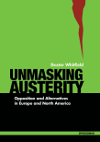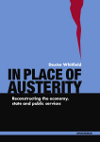SPOKESMAN BOOKS
Press Release
GLOBAL AUCTION OF PUBLIC ASSETS: Public sector alternatives to the infrastructure market and Public Private Partnerships by Dexter Whitfield
Public infrastructure in the 21st century is confronted with new challenges; adapting to climate change, meeting the economic, energy, water, transportation and social infrastructure needs of megacities in Asia, megaregions in North America, European city regions, and older industrial areas. Yet Public Private Partnerships and the global infrastructure market, financed by investment funds and pension funds, are fuelling a new era of public asset sales. The key findings of this first critical, global analysis of these developments are:
Public Private Partnerships are not an alternative to public investment, nor do they reduce public debt. Ultimately, PPPs are entirely financed by government and/or user charges, fares and tolls – private debt ratcheted up in PPPs is in practice public debt embodied in long-term contractual obligations which must be paid off through public sector revenue accounts. There is no quick fix or a cheap, low tax solution. Despite these structural flaws, PPPs continue to be embedded in the public sector.
Public Private Partnerships have similar structural flaws to the causes of the current global financial crisis. Public Private Partnerships are designed with special purpose companies, off-balance sheet accounting, limited accountability and transparency, securitisation, outsourcing and offshoring, secondary market refinancing and shrouded in commercial confidentiality – precisely the policies and practices that led to the global crisis.
There is a new threat of privatisation and asset monetization as governments and cities confront continuing needs with plummeting resources. Chicago, New York, Los Angeles and several states plan to sell off existing assets; Russia and Poland have recently announced privatisation plans; whilst in Britain new PPP models are being developed.
A global infrastructure market has emerged, fuelled by pension funds, mutual funds and insurance company investment, which account for 82% of global investment assets. However, new power brokers such as sovereign wealth funds and private equity funds are powerful investors in the global economy and have a key role in the acquisition of infrastructure assets.
Schools, hospitals, roads and prisons are being traded as commodities. Britain has the most developed PPP market that now has a secondary market in which share equity in PPP projects is bought and sold. Several hundred PPP projects, with a total value of £2.8bn, have been sold to new investors in the last decade. 65 PPP projects alone were sold at a profit of £257m. Several secondary market funds, established to own and operate PPP projects, have been sold to other companies. Some PPP projects are now operated from offshore tax havens.
There are many failed Public Private Partnerships and privatisation projects. Globally, nearly 1,000 PPP projects, valued at over US$500bn, have been terminated or radically reduced. This includes 58 water projects, many covering entire regions and countries. Many other projects never got off the drawing board, and were abandoned. The claim that infrastructure PPPs can be ‘pro-poor’ by achieving significant political and economic change is unfounded.
Democracy and accountability are undermined. Most PPP projects have little democratic control or transparency. They are costly, poor value and lack innovation. Risk transfer is exaggerated and based on the false pretext of non-reform of public sector contract management.
Value for money methods are contrived and flawed. The evaluation of PPP projects through Public Sector Comparator or value for money assessments is contrived and fundamentally flawed because of the narrow scope of the criteria and the failure to compare like with like.
PPPs and privatisation frequently result in job losses, cuts in terms and conditions including pensions and more fragmented trade union organisation.
Reform of the Public Private Partnerships model will achieve little. Powerful vested interests, including banks, construction companies, lawyers and consultants, will ensure any re-assessment will be focused on the minutiae of PPP finance and risk transfer. They have no intention of challenging the model, preferring to massage contractual matters to ensure the flow of deals continues.
New public investment priorities are needed. Global Auction of Public Assets sets out new investment priorities for generating economic development and jobs, meeting infrastructure needs, responding to climate change and managing public debt and the fiscal crisis. It proposes radical changes in global financial markets, abandonment of PPPs, new controls on existing PPPs, new public sector contracts, and public management reform. Proposals include a new comprehensive Infrastructure Investment Evaluation Framework and an Infrastructure Stress Test.
Stronger and broader alliances between civic, community and trade union organisations need to be built, with blueprints and alternative plans to detail infrastructure needs and strategic intervention in the planning and procurement process.
Public infrastructure supports economic development, increases productivity, generates employment, creates opportunities for production and supply chains in construction, manufacturing, services, and improves community well-being. It meets basic human needs – homes, water, energy, transport, hospitals, schools, sports and cultural facilities, communications networks, courts, prisons, civic and governmental buildings. Global Auction of Public Assets examines PPP programmes in the UK, France, Ireland, Germany, the US, Canada, Russia, Australia, China, India, Brazil and South Africa.
Dexter Whitfield is Director of European Services Strategy Unit and Adjunct Associate Professor, Australian Institute for Social Research, University of Adelaide. No embargo: Publication January 2010 by Spokesman Books, Nottingham. England. Order online at www.spokesmanbooks.com or through bookshops. 380 pages, 45 tables and charts, 650 references Price: £18.00 ISBN 978 0 85124 773 1
For further information please contact Dexter Whitfield – Mobile +44 (0) 777 6370884 Tel +353 (0) 66 7130225 Email: dexter.whitfield@gmail.com Website: www.european-services-strategy.org.uk Postal address: Dexter Whitfield, Duagh, Camp, Tralee, County Kerry, Ireland
Tony Simpson, Spokesman Books Tel: +44(0)115 9708318 Email: elfeuro@compuserve.com
“Most studies of Public Private Partnerships and privatisation pay scant regard to the growth and scale of this global market, and in particular the competition for resources between infrastructure sectors, between construction and finance capital, and between companies, the state and development banks. Equally, the long-term implications of the infrastructure market and PPP policies are frequently ignored.” Dexter Whitfield
Download Press Release




